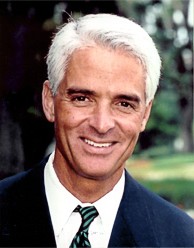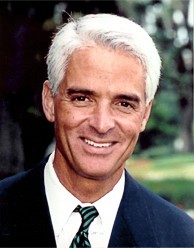 Florida Gov. Charlie Crist declared his candidacy for U.S. Senate on Tuesday, aiming to help recover an increasingly endangered species — the moderate Republican — in increasingly hostile habitat — Washington, D.C. Crist is running for the seat now held by fellow Republican Mel Martinez, who intends to leave the Senate when his first term ends in 2010.
Florida Gov. Charlie Crist declared his candidacy for U.S. Senate on Tuesday, aiming to help recover an increasingly endangered species — the moderate Republican — in increasingly hostile habitat — Washington, D.C. Crist is running for the seat now held by fellow Republican Mel Martinez, who intends to leave the Senate when his first term ends in 2010.
Crist has been proactive on climate change, in the mold of Arnold Schwarzenegger. In October 2008, his administration unveiled an ambitious climate plan.
Grist’s Amanda Griscom Little interviewed Crist last year and asked about his commitment to the climate cause:
Q: Was there an “a-ha!” moment when you realized that [climate change] is one of the most significant problems of our time?
A: Terry Tamminen [former senior adviser to Schwarzenegger and former head of the California EPA] really had a profound impact on me. He came to me in February of [2007], shortly after I got sworn in. He brought a map of the United States with him. He showed me what’s happening [on climate policy] in California, and the Western states, and the Northeast, with some very good leadership from governors, frankly. And then he showed me the Southeast — there was this void in this region in terms of moving forward on climate change. And he said, “Governor, if you will seize the moment, you’ll have an opportunity to make a difference to our country.” I listened to him, I heard him, and I accepted his challenge.
Q: Have you heard much from your constituents about climate change? Do you think Floridians are more worried about the problem than folks in other parts of the country?
A: That’s probable. Look at us: we’re this giant peninsula that sticks out between the Gulf of Mexico and the Atlantic Ocean. It’s obvious to me, and I think most Floridians, that we’re the state that is the most susceptible to climate change, particularly rising sea levels. That creates an even greater sense of urgency for me. But it’s also a joy. I’m not a gloom-and-doom guy — I’m an optimist. I think we do have time to turn this around, and I think that the kinds of things we’re doing will certainly help.
Q: I read a study a few weeks ago from Tufts University that found climate change could cost Florida $345 billion a year.
A: If we don’t address it, that’s right. Tourism as an industry is incredibly important in producing jobs for our state. We get 85 million visitors a year to Florida, and they don’t come here because she’s ugly; they come here because she’s beautiful and the climate’s great. …
But there’s another side to the economic argument: There’s gold in green. Florida Power & Light, a company that I used to take to task as attorney general of this state, has really jumped on board. They’re planning to build one of the largest solar energy plants in the world.
Griscom Little also asked Crist about his resistance to new coal-burning power plants in his state. “I don’t like coal — I flat don’t like it,” he said, while also noting, “I don’t want to close the door on coal if it can be done clean.”
Like many in his state, Crist long opposed offshore oil drilling, but then he awkwardly and reluctantly shifted his position last year when trying to get on John McCain’s VP short list.
“It’s the last thing in the world I’d like to do, but I also understand what people are paying at the pump, and I understand the drag it is on our economy,” Crist said in June 2008, shortly after McCain called for ending the federal ban on offshore oil and gas exploration. “Something has to be done in a responsible, pragmatic way.”
Crist is thought to have a good shot at the Senate seat, and if he wins, it could be a nice plaform for a 2012 presidential run. As the AP reports, “He has maintained approval ratings in the high 60-percent range despite the state’s gloomy economy, budget cuts, a high foreclosure rate and the highest unemployment level since 1975. That popularity is credited to an unwavering optimism, bipartisan attitude and the projection of a sense that he cares.”



